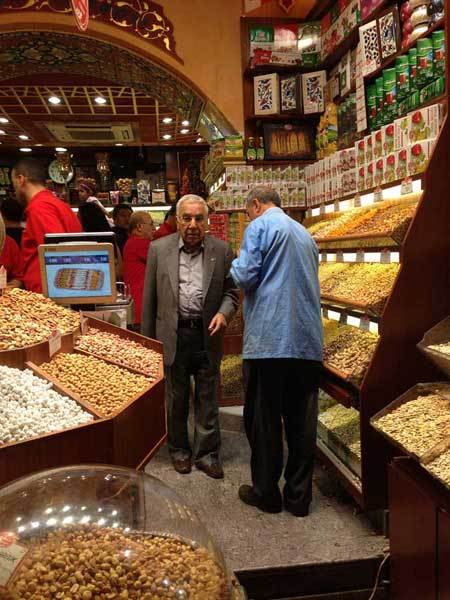On the great divide
 |
|
The Egytian Market sells Turkish delights of every imaginable variety.[Photo by Pauline D. Loh / China Daily] |
The Museum of Innocence is also a novel by Turkish Nobel Laureate Orhan Pamuk, published in 2008. The physical building is a collection of memorabilia from the star-crossed romance of the protagonists - a wealthy businessman and a lowly shop girl.
It is a testament, too, to the author's creative process. At the entrance is an entire wall studded with cigarette butts from the smokes he shared with friends while writing the novel, and each stub is carefully documented with name and date.
To the visitor, though, the exhibits give a rare glimpse into some intensely personal details of life in Istanbul during the 1970s to 1980s, even as they wonder which is truth and which came from the imagination of the novelist.
As we emerge from the cavernous depth of the museum, it is to walk through the steep lanes that thread the hills, filled with little flea markets, antique shops and fruit stalls offering juice freshly squeezed from ruby-red pomegranates.
This exotic fruit is much loved here, and piles of it can be seen everywhere. One of my souvenirs from Istanbul is a group of three ceramic pomegranates, bursting at the seams with sparkling red glass seeds.
It also appears often in motifs and graphics from the palace walls to the carpets sold at the Great Bazaar. At the Egyptian Market, the most delicious Turkish delights were dimly glowing squares made from pomegranates, almonds, pistachios and Turkey's famous honey.
And yes, this is a land of milk and honey, and olives and grapes, peaches and figs.
Istanbul is a gourmet's delight, with delicious offerings everywhere. Street corner vendors offer Turkish breads that look like giant pretzels, roasted chestnuts and corncobs, trays of steamed mussels served with wedges of lemon, and, of course, the ubiquitous kebabs, baklavas and sweetmeats.
These compete with restaurants that offer dinners a glimpse into Turkish cuisine, mainly based on lamb but also featuring beef and seafood.
Turkish coffee is an experience for the strong-hearted - so strong it is almost semi-solid and so potent it may give you palpitations. It is the tea I like best, served in elegant glasses with nipped-in waists, sweetly energizing after a long day of sightseeing.
Istanbul is like a Turkish hors d'oeuvre, a tantalizing taste of things to come.
Already, I am saving up and planning a more thorough exploration of this delightful, surprising country, full of colorful sights and sounds.
If you go
FLY: Turkish Airlines/Air China fly direct from Beijing to Istanbul. It is an overnight flight so you arrive as dawn is breaking over the Bosphorus. www.turkishairlines.com
STAY: Shangri-la Bosphorus is a super five-star hotel with an unrivaled view of the Golden Horn. www.shangri-la.com/istanbul/shangrila
MUST-SEE: Dolmabah?e Palace, Basilica Cistern, Hagia Sophia, Museum of Innocence, Great Bazaar, Spice or Egyptian Market.
BUY: Turkish carpets, kilims, tooled silver coffee cups, colorful ceramic crockery, Turkish delight, almonds, pistachios, dried figs and apricots.
DO: Spend a quiet moment sitting by the banks of the Bosphorus to enjoy the view. Have a cup of tea at the Grand Bazaar and take in the sights and sounds. Indulge in a rejuvenating Turkish bath or hamman, and emerge scrubbed and with baby smooth skin.





















